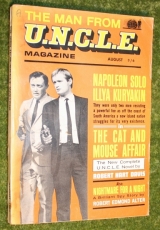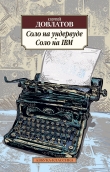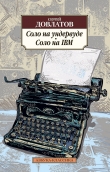
Текст книги "[Magazine 1966-08] - The Cat and Mouse Affair"
Автор книги: Robert Hart Davis
Жанры:
Боевики
,сообщить о нарушении
Текущая страница: 2 (всего у книги 6 страниц)
"Then someone else may be directing him and his gang," Solo completed.
"Precisely," Waverly said. "And not necessarily another power or government. Zambala is highly strategically placed."
"THRUSH?" Solo said.
"The possibility has occurred to me," Waverly said. "Steng might be just the man to be fooled by THRUSH suggesting a third-road government."
"Is there any hint of THRUSH?"
"No, I must say there isn't—yet. As it stands, Premier Roy has been forced to kill a would-be assassin, and Mura Khan, Security Chief of Zambala, has been assassinated. Both the man Roy killed, and the man who was suspected of killing Mura Khan, were known members of the Stengali. O'Hara seems to think there is some connection between Zamyatta and the Stengali now. O'Hara also reported that Inspector Tembo was not happy with the whole affair. All in all, Mr. Solo, it adds up to a state of unrest in Zambala, and that is something we do not want."
"What about this international tribunal?" Solo said. "Can they do anything?"
Waverly puffed on his pipe. "Perhaps. I think the tribunal is primarily a good move by Premier Roy to forestall civil violence. The Zambalans are hot-blooded. But a tribunal may make them feel the situation is being handled fairly. Especially with Ramirez heading the tribunal. Miss Heatherly, please."
A fourth picture flashed onto the screen. It was the picture of an old man, tall and white-haired, the epitome of a Spanish grandee of the old school.
The eyes were strong and alert, and the man leaned heavily on a cane.
Waverly smiled as he looked at this picture. "Carlos Ramirez, Mr. Solo. A living legend," he said. "The greatest poet of South America, a fighter in all causes of freedom, and a life-long pacifist. A truly amazing man, Carlos Ramirez. I have had the privilege of meeting him many times. He began life as a landowner and grandee, inherited the largest sugar plantation of the island, built it into many businesses.
"Then, in middle-age, he became a poet and world-renowned pacifist. Still later, when the struggles for freedom began, he joined the fight. His leg was shattered by a British bomb. He is the only man I know who has engaged in violence while remaining a pacifist and meaning it. A man of great dignity. With him on the tribunal, the world will take notice."
"Who are the other members?" Solo asked.
"Two men from the West, one from Poland, one from India. Three Zambalans: Ramirez, O'Hara, and a labor leader named Mark Boya. But Ramirez is the guiding genius."
"And you want me to go down and stay close to the tribunal?" Solo said.
"Yes. I fear possible attacks on the tribunal itself. We—"
The low beep-beep-beep of overseas communication began to sound from the large console in the small office. Waverly touched a button on his desk. Instantly a voice entered the room, the voice of Martin O'Hara.
"—report a bomb thrown at the tribunal, two injured. Also a second attempt on the life of Premier Roy. Situation urgent; Stengali apparently making all out war. In my opinion they must be getting help, probably from elements of the army."
Waverly held his microphone. "Any further word from Mr. Kuryakin?"
There was a pause. Then, "Unable to contact agent Kuryakin!"
FIVE
The Harbor Inn on the waterfront of San Pablo was a small tavern with two rooms and a kitchen in the rear. The first room contained the bar and some tables. The second room, through an archway, contained booths on either side. The kitchen opened to the rear of this second room.
Less than an hour after they had left the black car, the three men in business suits sat in a rear booth. They looked at their watches from time to time. They did not notice the shabby dock-worker who limped into the tavern and stood leaning on the bar at the end nearest the rear room.
This dock-worker was small and slender, and his black hair was cut thick and long. His nose was heavy and broken, and there was a long scar on his dark face. His clothes were the rags worn by the poor of San Pablo. He drank the cheapest raw rum made for the poor from the dregs of the sugar cane. To look at he was no different from thousands of other poor workers of San Pablo. Even his limp was common in a country where the poor worked hard and were often injured.
But his eyes were not the eyes of a San Pablo dock-worker. They were sharp eyes, shrewd and glittering and they were blue!
They were the eyes of Illya Kuryakin.
Kuryakin watched the three men.
He watched them for an hour before the other two men came into the Harbor Inn.
The two newcomers were a grotesque contrast. The man who came in last was broad and powerful and held his hand in his suit pocket. The man who walked in front of the broad man was small and frightened. This small man wore a white suit and his hands shook. His eyes darted around like some small animal looking for escape. There was no escape.
The scared man was marched to the booth where the three men waited.
The man in the booth who spoke was obviously the leader.
"Sit down, Nathan," the man said.
Where he leaned on the bar Illya watched this man, the one who had spoken. He saw that this man was of average height, not big but in good condition, with the movements of a trained soldier. His hair was grey and long. There were scars on his face. He could have been the old beggar with a patch over his eye and a certain amount of make-up.
"Give Mr. Bedford room to sit down," the man said to his companions.
Illya Kuryakin immediately turned his attention to the small man who was so frightened. Nathan Bedford! That was the name of the owner of The Morgan House, the cheap hotel where Premier Roy had killed the Stengali leader, Tavvi. A very frightened Nathan Bedford. The owner of the hotel sat down like a man sitting on the edge of a very high cliff. The grey-haired man with the scarred face smiled pleasantly.
"So, Nathan," the grey-haired man said. "It has been a long time. Alas, we do not get into San Pablo often."
"Too long, Mr. Smith," the frightened Bedford said.
"We were always friends, Nathan."
"Of course, Mr. Smith. The best," the terrified owner said.
"Then you will tell me all about what really happened the night the premier shot Tavvi, won't you?"
"Sure, sure, Mr. Smith," Bedford stammered. "Only I was downstairs. You know I stay downstairs. I didn't see—"
"Suppose I judge that? You just start from the very beginning. Now, who paid for that room?"
Bedford licked his dry lips. "Tembo asked me that, too. I don't know. It was a woman. She wore a veil. She came in and took the room from my assistant. She gave her name as Brown. Then—"
The frightened owner suddenly lowered his voice and bent closer to the man he called Mr. Smith. At the bar Illya moved closer, then started for a booth. He saw the eyes of the other men with Mr. Smith watching him closely. Instead of stopping at a booth he continued on back to the men's room near the kitchen.
When he came out, Bedford was already standing up. The grey-haired man called Mr. Smith was still seated and staring up at Bedford. The hotel owner was as pale as a ghost. Then Smith waved his hand.
"All right, Nathan. But try to remember a little more, eh?"
"Yes, Mr. Smith. Anything I remember."
"Good," the grey-haired Mr. Smith said. "See Nathan to the door, Sergeant."
The broad, powerful man nodded to Bedford and the two men headed for the door. Illya, passing the booth on his way back to the bar, limping in his dock-worker's rags, heard the use of the rank. Smith had called his man Sergeant! Then the men from the black car, the beggar, and the powerful man were all members of some military unit!
At the bar, Illya ordered another of the cheapest rums, and paid for it, just as the powerful man returned. Illya watched the men from the black car put their heads together in the booth for a conference.
Then he heard it.
A faint, strangled cry.
Low or distant, it was impossible to tell which.
But Illya had heard the cry, there was no doubt. And he was not the only one. In the booth the men in business suits stopped talking and sat alert. The bartender stopped mixing a drink to stare at the door. Two other men at the bar turned.
Illya was on his way to the door. He reached it and went through on the run. He saw the cause of the cry in the middle of the street.
Nathan Bedford lay there. Illya did not have to go to the man. Bedford lay on his back with his throat cut wide open, a pool of blood spreading from him.
There was no one else on the street.
But far down the dark waterfront Illya thought he saw a tall black figure running silently away. He watched the figure until he became aware of something behind him.
The disguised U.N.C.L.E. agent whirled. The men from the black car stood close behind him. They were looking at the body of Nathan Bedford, and at Illya. They were looking at his leg. Too late Illya realized his mistake. In his haste to get out and find the source of the strangled cry he had forgotten to limp.
Now the grey-haired man, Mr. Smith, raised his hand slowly and pointed to Illya's eyes. In making his disguise there had been no time to disguise his eyes with contact lenses. His eyes were blue! Black hair and a dark skin and the rags of a native Zambalan dock-worker—with blue eyes.
The men came toward him with their hands in their pockets.
Illya looked around quickly. Behind him two more men in business suits. Illya wasted no time. He reached into his pockets and dropped the small smoke bomb.
As the smoke exploded, raising a blinding smoke screen, Illya turned with his U.N.C.L.E. Special out and ran toward the two men behind him. His Special set on sleep-darts, he shot one of the men at once. The other hurled himself sideways and clawed for his pistol. Illya shot him. He leaped over the prostrate forms of the two men and raced away down the street.
The black car, its lights on, blocked his path. He whirled and raced toward the water. As he reached the edge of the water a light flashed on him from below, from some boat. To escape the light, Illya ducked and began to run to his right.
The land ended abruptly in a sharp right turn.
Illya whirled. They were all around him. Something struck his head and it all turned green and red and—black.
In New York, Alexander Waverly sucked on his cold pipe and slowly paced his silent office. The outer door slid open. Napoleon Solo entered. The face of the handsome young chief agent of Section II showed concern. Waverly wasted no time on useless words.
"O'hara reports that all attempts to contact Kuryakin have failed. Two of his agents discovered that a man named Nathan Bedford was killed in the street on the San Pablo waterfront."
"The owner of The Morgan House," Solo said.
"Precisely," Waverly agreed. "The police have no clues. The patrons of the Harbor Inn, a waterfront tavern nearby, claim to have heard nothing."
"Naturally," Solo said.
"They claim further that a crippled dock-worker ran out of the Harbor Inn about the time of the killing. They said he ran, although he seemed to be crippled."
"Illya!" Solo said.
"O'Hara agrees. The men he sent found a black wig floating in the water nearby. I should say that Mr. Kuryakin is in need of help."
"I'll be on a plane in an hour," Solo said.
Waverly nodded. "Yes. See that you are. But remember, Mr. Solo, your primary mission in Zambala is to find out what is behind these assassinations and attempts. That comes first. if you have time, see what you can do for Mr. Kuryakin, but the mission is first, as always."
"Yes, sir."
Waverly began to light his pipe. "I rather imagine Mr. Kuryakin can take good care of himself. In a way, this may be all in our favor. I trust Mr. Kuryakin is learning much."
"Yes, sir," Solo said as he left.
The cold manner of his chief did not fool him. Waverly was as concerned as he was about Illya, but Waverly headed an organization charged with saving the world from itself if necessary, and one agent was only one agent.
To Napoleon Solo it was different. This agent was Illya Kuryakin.
* * *
Illya Kuryakin opened his eyes. The blond agent grimaced at the pain in his head. He felt his head and found a soft and sticky wound. He tired to rise and found his feet tied securely.
A voice spoke. "Now tell us who you are and who you work for."
Illya looked across the room. Seated on a chair in the room that was not a room but a cave, was a small, wiry man of about forty. The man was dressed all in black with some kind of military insignia on shoulder straps. The man held a pistol and wore soft black boots.
Next to the small, wiry man stood the grey-haired Mr. Smith.
"I'm a voodoo doll," Illya said.
The small, wiry man stood up and came close to Illya. The blond U.N.C.L.E. agent looked up at the man. He saw that the small man wore a thin beard that was almost white, a wisp of long hair on the man's chin. And the eyes that looked down at Illya were large and deep, the powerful eyes of a fanatic.
"Tell us who you are," the man said softly.
Behind the small, wiry man with the wisp of beard there were many other men wearing black uniforms in the silent cave.
ACT II: GO, BID THE SOLDIERS SHOOT!
ONE
Police headquarter in San Pablo is the lower two floors of the left wing of the prison. At night there is only a guard at a desk just inside the door. Police are there, but the corridors are dim and quiet during late night hours.
This night, the single guard dozed at his desk. Since the murder of Nathan Bedford, the police had been working hard and the guard had done a double shift. With the murder, the assassination attempts on the premier, and the threat of a Stengali war, the San Pablo police were short-handed and the guard did not hear the soft footsteps approach him.
He cam alert just long enough to see the boyish young man leap on him and hold the cloth over his mouth.
The guard asleep, Napoleon Solo stepped over his prostrate form dn. moved on into the building. There were low voices talking somewhere as Solo moved as silent as a cat along the dim halls. The office of Inspector Tembo was on the second floor in the rear.
As yet the involvement of U.N.C.L.E. in the affairs of Zambala was not known, and Solo intended to keep it that way. He wanted to talk to Inspector Tembo, but first he wanted to search the office of the inspector. Tembo was aware of the true identity of Martin O'Hara, and had tacitly called U.N.C.L.E. into the matter. Solo wanted to know why.
He moved quickly up the stairs to the second floor. The long corridor was empty. There was no sound. At the far end of the corridor light showed under the door of one office. Solo moved catlike along the corridor. The door that showed light was Inspector Tembo's office!
Solo frowned. Tembo was in his office. There would be no opportunity to search. He put his U.N.C.L.E. Special away in its shoulder holster and stepped to the door. For some reason, some sixth sense perhaps, he opened the door quietly and without knocking.
It was a small office with a single window and the ground of the hill behind the prison close outside the window. There were two straight chairs, filing cabinets, and a small wooden desk. But it was not the furniture nor the office itself that Solo saw first.
And it was not Inspector Tembo.
The chair behind the desk was empty.
The window was open.
And behind the desk, studying papers on the desk, stood a tall, slender woman wearing a black uniform!
The woman heard him the instant he saw her. She looked up. Solo saw that she wore a black hood as a mask, only her sharp eyes visible through the eye-holes. Green eyes. Solo reached for his Special. The woman did not wait. Her hand snaked into her pocket and came out with a round, black object.
Solo threw himself backwards, his Special out.
There was no chance to fire.
The woman dropped the black object and a thick cloud of dark smoke filled the small office.
Choking, Solo backed out of the office and dug in his pocket. He brought out his miniature gas mask, opened it, and placed it over his nose and mouth. He ran back into the office and through the thick smoke.
The office was empty.
Solo went through the window in a single leap. Ahead up the hill the woman ran. She turned at the crest and fired. Solo dived for the dirt. The bullet whistled past his ear. He was up and running. At the crest of the hill he looked down. The woman was vanishing into a slump of trees. Solo raced down after her.
They came out of the trees.
Four of them—men wearing black uniforms, their ugly Soviet submachine guns in their hands and pointing up the hill at Solo.
The U.N.C.L.E. agent skidded to a halt on the steep downslope.
The four men began to move toward him up the hill.
* * *
Illya Kuryakin awoke and they were there again. The small, wiry man with the wisp of beard. The grey-haired man called Mr. Smith. The silent guards in the black uniforms. Illya struggled up to a sitting position on the cold floor of the cave.
They had been questioning him for hours. He had no idea what time it was, whether it was night or day, whether days had passed or only hours. As soon as he slept, they awakened him and it began again. The questions.
"Tell us who you are and who you work for," the small man with the thin wisp of beard asked quietly.
"No," Illya said, his voice a croak now, his throat dry for lack of water.
"Why are you in Zambala? Who sent you?" the man named Mr. Smith asked.
Illya said nothing. They were the same questions. Behind the two men who asked the same questions over and over, Illya saw the guards as silent and motionless as ever. There was nothing else, only the blank stone walls of the cave, the steel door behind the guard, and beyond the door, what?
"You were following the beggar? Why?" the man with the wisp or beard asked.
"You were watching the prison. Why?" the man named Mr. Smith asked.
Illya's weary mind came alert. These were new questions! There had been a sudden change, a shift in questions, as if the men in front of him thought that it was time to change, that his resistance was ebbing and a sudden shift would confuse him.
Illya fought to keep his mind steady, because they were almost right. The hours were beginning to work on him. He battled within his mind to keep control.
"Tell us why you were there at the prison," the man with the thin beard said. "What did you suspect?"
"What made you interested?" Mr. Smith said.
"What do you know about Premier Roy?"
"What was Pandit Tavvi doing in that room?"
"Why was Tavvi killed?"
"Who sent the premier to that room?"
"Who do you work for"
"Who are you?"
Illya's mind reeled. No sleep for—how long? Was it day or night? Where was this cave? Where was Napoleon? Illya felt his mind slipping—slipping -slipping—With a powerful effort, unseen by the pounding questioners, he moved his free forearm across one of the rings on his right hand. With his thumb, the thumb of his right hand, he pressed hard against the ring on the inside. He felt the tiny prick.
The needle, which came a hair out from the ring when he pressed against the inside of the ring, pricked his forearm. He hung on, forcing his brain to remain alert. Ten seconds—twenty seconds.
Almost a minute, and the questions continued to reel against his brain. Then he felt it, the powerful drug coursing through his body, the emergency drug intended for just such a situation, to be used only in extremity because of its side-effects.
The drug entered his brain and, suddenly, he felt no more fatigue, no weariness, no slipping of his senses. He felt strong, alert, in complete control. He showed none of this to his interrogators. Instead he continued to pretend that he was on the edge of breaking.
"What really happened at The Morgan House?" the man with the wisp of beard said.
"Why was Tavvi there?" Mr. Smith said.
Illya listened now, his brain clear, more than clear. Alert, he heard the questions. They were asking him what they should have known! Pandit Tavvi was one of the Stengali, and these men had to be the Stengali—or did they? He had been sure that these were the Stengali, but now—if they were the Stengali, why were they asking what had happened I that room of The Morgan House? And if they were not the Stengali, who were they?
* * *
Napoleon Solo laid down a withering fire from his U.N.C.L.E. Special on automatic. The four men in black went to ground. Instantly, Solo crawled back over the crest of the hill and ran down the hill, back toward the prison. The four men came to the crest of the hill, stood there against the lighter dark of the sky for a moment, and then vanished.
Solo stopped running. He stared back up the hill. There was no doubt; they had stopped their pursuit. He turned and went back to the window, climbed through into the office of Inspector Tembo. His foot struck a soft object behind the desk.
He looked down and saw the body.
The body of a gaunt-faced man of medium height. It had been behind the desk, between the desk and the window, and Solo had not seen it when he pursued the woman. Now he saw it, and he guessed at once who it was. To be sure, he bent down and took out the man's wallet. The identity card left no doubt: Inspector James Tembo!
Solo stood up and rubbed his chin. He would not have the chance to question Inspector James Tembo. The man had been stabbed once, expertly and finally. Why? Without a doubt so that someone like Solo could not question the inspector.
Which meant that someone knew, or thought, that the inspector had known something important.
What? Solo looked down at the littered desk of the dead man. The woman had been searching the desk when he surprised her. He studied the papers on the desk and found that the folder on top was the folder of the killing of Pandit Tavvi and Mura Khan. A notation was written across the page in a neat, precise hand:
"Why would Tavvi go to the room alone? Why would Roy go alone? Check movements of P. Tavvi."
Solo's eyes glistened as he read the notations—Inspector Tembo had not been satisfied with the explanations of the events in The Morgan House.
But that was all. The rest was the routine report Solo already knew in detail. The agent turned his attention to the office itself. Everything seemed in order. Then his eyes fell on the small object beside the body of Tembo.
Solo bent and picked it up.
It was a matchbook with the name "Jezzi Mahal, The Silver Dunes." Solo grinned. It looked very much like his masked lady had left her calling card. Solo decided he would pay a call on Miss Jezzi Mahal.
But before that, he would pay a visit to The Harbor Inn. If Illya had not reported in. Solo took out his pencil-radio and pressed the send button.
"Code four. Napoleon Solo to Zambala Control. Come in, Zambala Control."
The pencil-radio crackled. The voice of O'Hara's chief assistant was clear, cool, and enticingly female. "Zambala Control. Come in, Agent Solo."
Solo made a mental note to meet O'Hara's assistant as soon as possible. "Is there any word yet from Agent Kuryakin?"
"Negative. No contact with Agent Kuryakin since yesterday. Channel of his transmitter has been continuously open," the low, throaty voice said.
Solo nodded grimly. "Call as soon as there is contact. Make it a priority One, Code ten."
A priority One was the only call that could break radio silence to an agent on active assignment. "Priority One. Will do. Over and out."
For a brief moment, Solo imagined the face and form of the female voice. Then he sighed aloud, climbed out the window over the motionless body of Inspector Tembo, and moved swiftly through the night to his car. He drove toward the waterfront and The Harbor Inn.
When he reached the silent and deserted area of the waterfront of San Pablo where The Harbor Inn's lights were gaudy in the night, Solo reached into his attache case on the front seat beside him and took out a small electronic instrument. He parked his car and got out. The instrument in his hand, he started at the door of The Harbor Inn.
The instrument showed no response. He walked away from the inn toward the edge of the water, where the wig had been found floating by O'Hara's men.
The instrument began to register at a spot where the sidewalk turned sharply away from the water. Solo smiled to himself. Illya had left the trail—the private trail of sensitized liquid from his shoes that only Napoleon Solo could pick up on his detector.
Solo returned to his car, and, with the detector set on the dashboard in front of him, picked up the trail and started to drive out of the city. The trail led deep into the hills and jungle to the north of San Pablo.
A half an hour later, thirty miles north of San Pablo, Solo became aware that he was not alone.
The lights of a truck moved steadily behind him.
TWO
They had come and gone twice more before Illya Kuryakin saw his chance. The last time the black-uniformed guard failed to tie his hands securely, the many tieings and untieings having made the guard careless. After all, how could this small blond man escape from the locked cave room, even if he got his hands free?
Illya smiled grimly to himself—the guard would find out. He waited what he estimated were ten minutes for the routine of the guards to become normal. Then he went to work on his bonds. They were a fraction too loose. By using all his trained skills, the small Russian squeezed his open hand into the smallest space possible and strained to slip them through the bonds. Sweat stood out in beads on his head.
He strained, drawing his narrowed hand through the ropes—and the hand began to slip. Shaking the sweat from his eyes, the blond U.N.C.L.E. agent forced his hand harder and harder against the loop of the rope.
And his hand slipped out!
Quickly he freed his other hand and bent to the ropes on his feet. Moments later he stood and rubbed the circulation back into his legs.
Now he had to hurry. The stimulant drug would begin to wear off soon, and when it wore off his brain would give out, his muscles would go limp, his control would slip away, and he would sleep for thirty-six hours.
Moving swiftly, his face set in grim concentration, the small blond agent took off his belt and carefully felt the wide leather band. He drew out a flat foil packet, a thin thread, and a long thin wire. He replaced his belt and bent to his left shoe. From the heel of the shoe he took out a round ball the size of a marble. He stood up and crossed the silent stone cell to the steel door.
Bending close, his shrewd eyes alert under his lowered brow, he inspected the lock. He smiled—a single standard lock. He placed the foil packet on the lock of the door where it stuck with its self-adhesive. He attached the thin thread and rubbed it hard. There was a flash of flame and Illya leaped back.
The foil packet began to glow white hot, casting an eerie glare in the stone cell that made the shadow of the blond agent loom large against the stone of the walls. Then the glow ceased. Illya moved silently to the door and opened it. There was no guard outside. Illya stepped out, the long wire in his right hand.
The stone tunnel led to the left. At the far end there was a faint light. Illya glided silently toward the light. The tunnel opened into a small stone room with another steel door on the far side. A single guard sat at a rough table in the room. The guard was reading a book, his British Sten gun on the table in front of him.
Illya was across the room to the table in two quick bounds. The guard heard him and grabbed frantically for his Sten gun. The book slithered away across the cold stone floor. Illya had the wire looped around the throat of the guard. The guard fought. Illya hung on grimly as the heavier guard thrashed and fell to the floor on top of the small agent.
Illya tightened the wire, drew it closer around the throat of the struggling guard. His hands thrashing, the guard dropped the Sten gun and clawed behind him for Illya's face. His fingernails raked close to the eyes of the grim Russian.
Then his hands grew weaker, he flailed once more at nothing, and lay still.
Illya released the wire. The man groaned. Illya pressed a spot on the man's neck and the man lay still, unconscious. Illya found the keys on the unconscious man and crossed the silent room to the second door. He opened this door cautiously and found himself in another corridor. He moved down this corridor.
The cave turned out to be not a single unit but a honeycomb of passages and small rooms and larger rooms down side tunnels, where Illya heard activity. A vast maze of caves like the caves of Guam and Okinawa during the Second War, where an army could hide and vanish like wraiths in the wind.
Now the maze came to Illya's aid. By using his ears he was able to move unseen, hiding whenever any of the black-uniformed men approached, their footfalls clear on the stone floor. But the real aid was the narrowness of the tunnels. Through the dark and narrow passages the air moved strongly in a venturi effect, and, by feeling the direction of the air, the blond agent moved steadily toward the exit from the complex of caves.
He saw a faint silver light ahead, a round area of silver darkness, before he was discovered.
He saw the exit and passed a wide side gallery at the same instant. In the gallery men worked. A shout went up. Illya darted a quick glance at the gallery and saw the men in black running toward him. He knew that there would be guards at the entrance. His quick mind saw that he could reach the exit before he was caught, but there would be the guards.
He was dressed all in black.
He took out the tiny marble-sized object and hurled it at the advancing men from the side gallery. There was a flash of flame, a loud explosion, and thick white smoke blocked the men from the gallery. The cloud of white smoke spread with incredible speed. Illya ran shouting toward the exit.
"Attack! Attack! They've broken through! Everyone to the rear!" Illya shouted in perfect Zambalan-English.
His running black figure, the smoke and flame behind him, gave the three guards on the exit no chance to think. They left their position and came running toward him. Illya stopped, urged them on to the rear. They ran passed him, their weapons ready, their eyes on the thick cloud of smoke.








